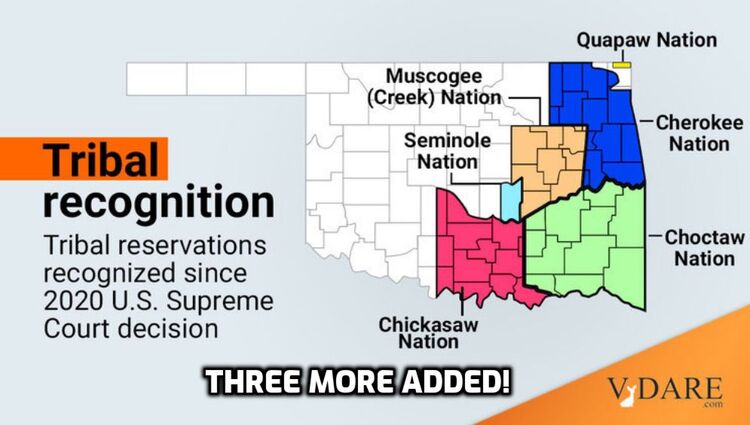


By Allan Wall
05/20/2023
By statehood in 1907, all Indian reservations in Oklahoma were abolished. But the Supreme Court’s McGirt decision in 2020 declared that the Creek reservation is still, at least for criminal law purposes, a reservation. This was expanded to also refer to the Cherokee, Seminole, Choctaw, Chickasaw and Quapaw tribes, which are now also said to have reservations.
It’s ridiculous. Go to Tulsa, Oklahoma and tell me you’re on an Indian reservation.
And we don’t yet know how far this is going to go and where it will lead.
Now, a ruling from the Oklahoma Court of Criminal Appeals has it that three more reservations exist in Oklahoma.
From KOSU:
Three tribal nations in Northeast Oklahoma have had their reservations deemed as ’never disestablished’ by the Oklahoma Court of Criminal Appeals. [Three tribal nations in Northeast Oklahoma have reservation statuses recognized, by Allison Herrera, KOSU, May 17, 2023]
The three tribes that supposedly have reservations are the Ottawa tribe (population 2,500), the Peoria tribe (population 3,713) and the Miami tribe (population 3,908); all three of which have their headquarters in Miami, Oklahoma, in the northeastern corner of the state.
Just as in McGirt, this decision originated from a criminal case.
Winston Whitecrow Brester, a citizen of the Seneca-Cayuga Nation, filed for post-conviction relief in November 2020 over a string of crimes he was convicted of between 2018 and 2020 in Ottawa County. After the landmark McGirt v. Oklahoma ruling, Brester claimed he was tried in the wrong court. His crimes were allegedly committed on the Ottawa, Peoria and Miami Tribe’s reservations — therefore, he said, he should be tried in federal not state court because their reservations were never disestablished.
So Brester belongs to the Seneca-Cayuga, another small tribe in northeast Oklahoma, but he committed his crimes on the former Ottawa, Peoria and Miami reservations. So his lawyer thought, hey, let’s say these are reservations so the feds have jurisdiction and not the state of Oklahoma. Ingenious.
Last week, the Oklahoma Court of Criminal Appeals sided with Brester after the state objected saying their reservations were terminated and tried to assert concurrent jurisdiction under last summer’s Oklahoma v.Castro-Huerta ruling. The state argued that termination era policies in the 1950s by Congress did away with the Ottawa and Peoria reservation, and that Oklahoma should be able to prosecute Brester.
The state should have argued that the reservations were abolished by statehood in 1907. That’s what Chief Justice Roberts argued in his McGirt dissent in 2020, which is a better argument. They could have used Roberts’ same arguments.
Termination era policies ultimately failed and 20 years later, during the Nixon administration, Congress again committed to its trust responsibility. It passed acts that reinstated the tribal nation’s status as sovereigns, including the Peoria and Ottawa tribes. The state argued otherwise, but the court pointed to language within the McGirt decision: “To determine whether a tribe continues to hold a reservation, there is only one place we may look: the Acts of Congress.“
That means Congress must expressly say that a reservation status of any tribal nation has been disestablished.
Congress could end all this by just declaring that all reservations in Oklahoma were abolished by 1907.
“In sum, the Treaty of 1867 created a reservation for both the Ottawa and Peoria Tribes,” the court said. “These reservations, even if diminished or terminated by each Tribe’s respective termination act, were restored by Congress with the express and unqualified repeal of these termination acts in the 1978 Reinstatement Act as well as with the express reinstatement of all rights and privileges lost in connection with termination.”
The Miami, Ottawa and Peoria tribes all filed amicus briefs supporting Brest’s claim.
Last week’s decision caps a monthslong dilemma for northeastern tribal nations. In April, Oklahoma Attorney General Gentner Drummond sent a letter to Ottawa County District Attorney Doug Pewitt, telling him that the state should exercise criminal jurisdiction while several cases were pending before a decision was reached on the status of those reservations. The letter was in response to cases being dismissed by district court judges or district attorneys because they were waiting on a ruling.
Oklahoma’s Attorney General Gentner Drummond supports the McGirt decision. Gentner, the state’s highest law-enforcement official, is also refusing to enforce the recently passed Oklahoma law prohibiting sex change operations for children.
There were three other cases similar to Brester’s asking for the Ottawa District Court to dismiss their charges for lack of jurisdiction.
The Oklahoma Court of Criminal Appeals has now ruled that eight tribal nations in Oklahoma have never had their reservations disestablished after the McGirt ruling in the summer of 2020.
Joe Halloran, the attorney working on behalf of the tribes, said he was pleased with how thorough the court looked at termination era policies. He also nodded to AG Drummond for his efforts.
“It’s notable that AG asserted control over state’s appeal, confirming [the] Court of Appeals up or down question: Does the reservation exist or not?,“ Halloran told KOSU.
Halloran said it was incorrect for the state to insert the Castro-Huerta argument that the state has criminal jurisdiction
“You don’t get to the Castro-Huerta analysis until you rule on the issue of reservation,“ said Halloran. “We knew our Indian Country existed.“
Once again, Congress could easily fix this.